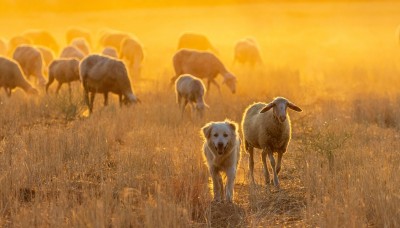Dealing with Hot Weather

Dealing with Hot Weather
by Betsy Hodge, former Ag Educator with CCE Lewis County. Modified by Amy Barkley, SWNYDLFC Team
Just a few tips to deal with the weather…
For yourself:
First of all…don't decide to foot trim, shear, or otherwise stress your critters this week!
Take care of yourself first.
Wear light clothing.
Wear a wide brimmed hat and sunglasses if you are out in the sun.
Do the strenuous part of your chores early in the morning or late in the evening.
Drink lots of water.
Stay in the shade whenever possible.
Pour water on your head…wet hair is a great coolant.
Take lots of breaks.
Visit the local town beach to cool off.
Go to the movies and enjoy the air conditioning there.
Eat freeze pops and popsicles... or a big bowl of ice cream (:
Now your livestock:
Your animals create heat when they ruminate. It takes a while for this heat to dissipate. Usually, cool nights give them a chance to cool down. Lately the warm nights are especially stressful for them. See the article below about beef but it applies to all ruminant livestock.
Here's some things you can do to help them stay cool:
Provide shade
Run the fans (and get the llama to stop standing right in front of the fan!)
Dump and refill the drinking water a couple times a day
Fill the water in the evening so it has a chance of staying cool overnight.
Your grazing animals might be avoiding the walk out to the pasture so consider providing hay in the barnyard or barn so they don't keep picking the short grass that is there and picking up extra parasites.
Remember that bacteria, parasites and maggots grow well in this kind of weather so keep a sharp eye on your animals for fly strike, foot scald/rot, and bots.
Keep things as clean and dry as you can.
Make sure you see all your animals get up once a day so you can be sure they aren't sick.
Parasite loads in camelids and small ruminants can explode in this weather so do FAMACHA checks and watch for diarrhea or animals that lag behind the others. Bottle jaw (fluid accumulated under the chin/jaw area) also indicates a dangerous parasite load and anemia.
Older animals might need extra considerations - like their own pen, or extra feed, their own fan, etc.
Avoid stressing animals by moving/sorting if possible.
Put off projects like foot trimming.
Do keep up with the parasite checks and de-worming - remember most of the sheep or goats might be fine and one can have a big load and not feel good.
Don't forget mineral/salt at this time of year.
We make frozen dog treats for the big white guardian dogs - put a dog biscuit in a plastic container or zip lock bag and cover it with water and freeze - take it out of the container or bag and give it to the dog to play with. Some dogs like a good mud puddle (you can make one with a hose) and some dogs like a sprinkler or hosing down.
Don't forget your barn cats - they need clean water available and dry food in a clean place. They are pretty good at finding cool places if they want them.
Upcoming Events
Boots in the Barn: Cornell Dairy Research Updates
January 13, 2026
January 20, 2026
January 27, 2026
February 3, 2026
February 10, 2026
February 17, 2026
February 24, 2026
Join us for some or all!
Deerworm and Flukes in Small Ruminants Webinar
February 25, 2026 : Deerworm and Flukes in Small Ruminants Webinar
Dr. Mary Smith from Cornell's College of Veterinary Medicine and Dr. Rachel White from UMaine Cooperative Extension will be discussing the lifecycles, signs, prevention, and management of deerworm and liver flukes in small ruminants.
NYSDEC How to Get Certified Course
March 3, 2026 : NYSDEC How to Get Certified Course
Ellicottville, NY
NYSDEC training course in preparation to take the pesticide applicator exam.
Announcements
Cows, Crops & Critters Newsletter Sponsorship
TRYING TO REACH GROWERS AND AGRIBUSINESSES IN OUR SOUTHWEST REGION OF NEW YORK?Weekly Email Update: Shared with 625+ households who have signed up with our program.
Monthly Paper Mailer: To reach our stakeholders and farmers who lack internet access, we send out a monthly mailer where your company's logo and contact information would be featured with a mailing list of 330+ households.
If you sponsor our weekly and monthly publications you reach approximately 955 households.





